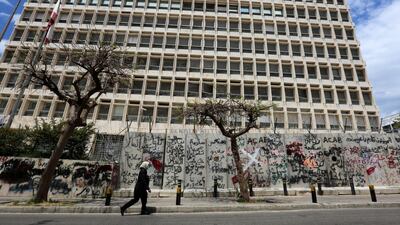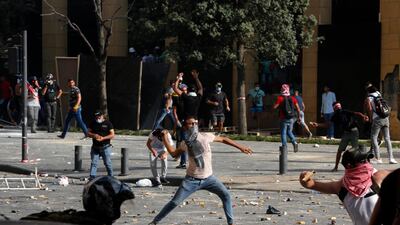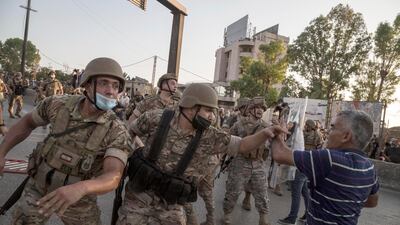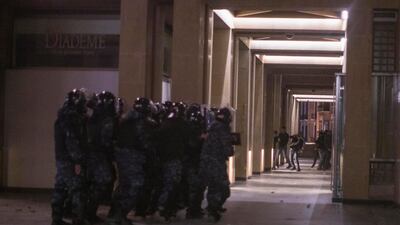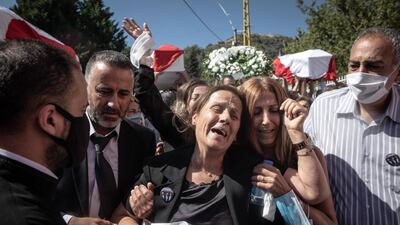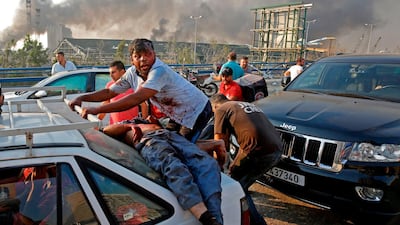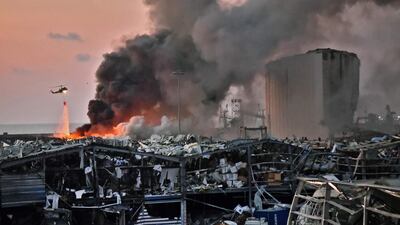Lebanon’s failure to reform its subsidy programme looks set to exacerbate a deepening financial crisis.
Central bank governor Riad Salameh sounded the alarm bells last month, warning the nation could only afford to subsidise vital imports at the official rate of 1,500 Lebanese pounds to the dollar for an additional two months.
The national currency has lost over 80 per cent of its value on the black market since the crisis unfolded in late 2019.
Mr Salameh’s remarks prompted meetings with caretaker Prime Minister Hassan Diab and members of his Cabinet to discuss plans to ration subsidies.
A month later, Mr Diab and his Cabinet have yet to agree on a plan to reduce the import bill, a source familiar with the talks told The National.
The dwindling foreign currency reserves held by Banque du Liban, as Lebanon's central bank is known, are currently estimated at $17 billion.
The situation threatens to plunge the country into complete darkness and over half of its population into poverty.
Among the floated proposals is a plan to replace import subsidies with direct cash assistance to low-income households.
Experts say this would reduce the burden on the central bank and curb the illegal smuggling of subsidised goods into Syria.
Redesigning the current subsidy programme to target only low to middle-income earners would also limit attempts to circumvent capital controls that banks imposed in late 2019, says Dan Azzi, a financial expert and former banking executive.
“Even if every family in Lebanon received up to $100 per month, this would save around 75 per cent of the cost of subsidisation, which is also subject to abuse through smuggling of funds abroad with fraudulent receipts to get around the capital controls,” Mr Azzi argues.
The current subsidy programme, he says is being literally burnt on cheap fuel.
"Filling up your car with gasoline today costs less than Saudi Arabia, and doesn’t distinguish between a rich Range Rover owner and a Kia owner,” Mr Azzi says.
“It’s not technically very difficult to identify truly needy families, through the analysis of certain variables, like the size of someone’s bank account, mobile phone bill, electricity bill, mortgage or rent payment, car loan payment, car brand, house square footage, etc.
"You can start out with a $100 payment for everyone, then an algorithm can be designed to subtract a certain percentage based on the above variables, such that a rich person, as defined by the weighted average of those variables, gets zero,” he says.
Restricting cash aid to families in need would further reduce the import bill, Mr Azzi adds, warning that if the current subsidies system remains in place, the Central Bank’s reserves would be consumed within 12-18 months.
“Not only would subsidies be removed then, but the electricity supply would be cut off when we run out of funds.”
The latter scenario seems likely if no agreement is reached over an alternative subsidy system to put in place, MP Selim Saade said in a recent televised interview.
“No one would dare eliminate subsidies completely before consuming it all unless an efficient alternative is found … I’m telling you, it [eliminating subsidies] is not happening,” he said.
Eliminating subsidies without providing social assistance to vulnerable households could prove disastrous for the country’s poor, UN agencies have warned.
The World Bank also warned that failure to enact reforms will plunge more than half of Lebanon’s population into poverty by 2021.
Reforms have been a long-time demand of the international community in exchange for providing Lebanon with much needed financial support to weather its crisis. But little progress has been made as political bickering intensified since the resignation of Mr Diab’s government after the deadly explosion that sent shock waves through Beirut in August.
The investigation into the explosion, which killed over 200 people and caused massive destruction at one of the region’s busiest ports and across large parts of the capital, has been marred by controversy with the country’s top officials trading accusations over who bears responsibility for the incident.
The political tensions surrounding the investigation and increased US sanctions on the Iran-backed Lebanese armed group Hezbollah and its key allies, including the president’s son-in-law and leader of the largest parliamentary bloc, have complicated efforts to form a new Cabinet tasked with implementing key reforms that the international community is demanding.
These include a stalled forensic audit of the Central Bank, which Lebanon has yet to undertake after consultancy firm Alvarez & Marsal, which was tasked by government to conduct the task, withdrew from the contract citing the “insufficient provision of information.”
A government source told The National that Lebanon has reinvited Alvarez and Marsal to undertake the audit after Parliament eased banking secrecy laws last month but has yet to receive a response from the consultancy firm.
Legal experts fear the ratification of the law is unlikely to pave the way for an audit any time soon since the appointment of a new auditor would necessitate a fully functioning government.
An audit of the central bank is a prerequisite for an IMF programme that Lebanon needs amid a deepening economic crisis that saw the country’s real GDP shrink by nearly 20 per cent in 2020, according to World Bank estimates.
